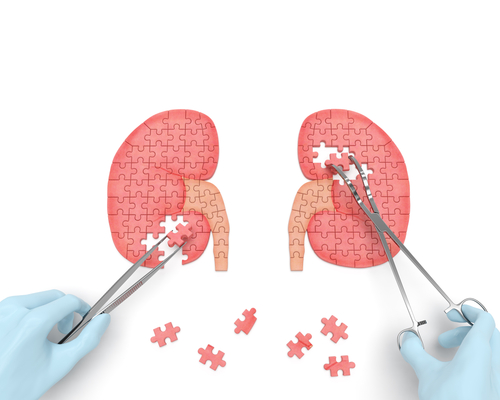Phase 2 Trial Data Show Bardoxolone’s Potential to Reverse Kidney Damage in Alport Syndrome

One year of treatment with Reata Pharmaceuticals’ bardoxolone methyl can reverse the damaging effects of Alport syndrome, promoting the recovery of kidney function, according to data from a Phase 2 trial.
Similarly, data from another Phase 2 trial has shown that the investigative treatment can also lead to clinically meaningful improvements in the renal function of patients with autosomal dominant polycystic kidney disease (ADPKD).
These positive results may support accelerated approval from the U.S. Food and Drug Administration of bardoxolone as an Alport syndrome treatment. According to FDA guidance provided to Reata, full approval of bardoxolone will require additional clinical data demonstrating that two years of treatment can support significant improvement in placebo-corrected, retained estimated glomerular filtration rate (eGFR).
These latest clinical data demonstrate the therapeutic potential of bardoxolone to “prevent or delay kidney failure in rare forms of chronic kidney diseases,” Warren Huff, president and CEO of Reata, said in a press release.
The Phase 2 part of the CARDINAL trial (NCT03019185) enrolled 30 patients, ages 12 to 60, who had a confirmed diagnosis of Alport syndrome.
After completion of 48 weeks of treatment with the investigational therapy, 22 of 25 patients experienced a significant improvement in renal function compared with the start of the study, with an improvement of 10.4 mL/min/1.73 m2 in eGFR.
Before beginning treatment, the participants were found to have kidney function decline at an average annual rate of 4.2 mL/min/1.73 m2. Based on this, the latest CARDINAL data revealed that treatment with bardoxolone represented a recovery of more than two years of average eGFR loss for these patients.
At week 52, after a four-week withdrawal period during which patients did not received bardoxolone treatment, a positive effect on renal function was noted with a retained eGFR benefit of about 4.1 mL/min/1.73 m2, compared with the start of the study.
“Today’s CARDINAL data demonstrate that one year of bardoxolone treatment can improve kidney function in Alport syndrome patients that have had progressive loss of kidney function while on standard of care,” Huff said.
Currently recruiting participants, the Phase 3 part of the CARDINAL trial is expected to enroll about 150 Alport patients who will randomly receive either oral bardoxolone or a placebo for one year (48 weeks).
“The magnitude of the observed retained eGFR benefit after withdrawal of drug versus the historical rate of eGFR loss suggests that the Phase 3 portion of CARDINAL is conservatively powered with respect to the key secondary endpoint of retained eGFR benefit,” Huff said.
Reata is also evaluating the effectiveness and safety of bardoxolone in other rare renal diseases, including ADPKD, focal segmental glomerulosclerosis, and chronic kidney disease associated with Type 1 diabetes, in the ongoing Phase 2 PHOENIX study (NCT03366337). Still recruiting, the study is assessing the potential of once-daily bardoxolone after 12 weeks of treatment.
Interim data revealed that 29 ADPKD patients experienced an increase of 9.3 mL/min/1.73 m2 in mean eGFR compared with the start of the study.
Similar to the results of the CARDINAL trial, in this group of patients, bardoxolone treatment induced recovery of about two years of average eGFR loss compared with before treatment initiation.
“The eGFR increase at Week 12 observed in patients with ADPKD suggests that long-term improvements from treatment with bardoxolone in other forms of CKD may translate to patients with ADPKD,” Huff said.
In both clinical studies, the investigational treatment was found to be safe and well-tolerated overall, with no treatment-related serious adverse events reported. Adverse events that were reported were generally mild to moderate in severity.
Bardoxolone has received orphan drug status from the European Commission and FDA as a treatment for Alport syndrome. These designations are expected to support and expedite the therapy’s development, regulatory review, and approval to treat kidney damage due to Alport syndrome.







Leave a comment
Fill in the required fields to post. Your email address will not be published.